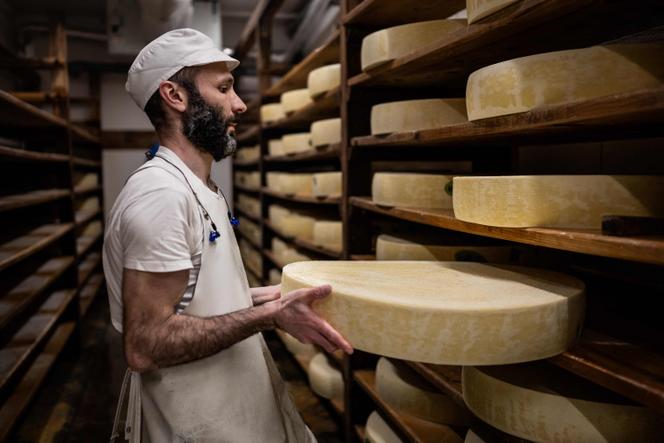


This is a controversy that only French politicians could create a stink out of. Since the publication on Saturday, May 10, of an article in French weekly Le Figaro Magazine portraying a supposed intention by the Green party (left) – referred to as "Green Khmers" – to ban comté, the entire French right has expressed outrage and rallied to defend the production of this cheese, one of the most consumed in France.
From the candidate for the presidency of the conservative Les Républicains party, Laurent Wauquiez, to the minister of agriculture, Annie Genevard, many leaders have expressed their support under the hashtag #TouchePasAuComté (#HandsOffComté), echoed even by the prefect of Jura, the eastern region where comté is made.
In reality, Le Figaro Magazine blamed the Greens for comments made by naturalist Pierre Rigaux in a radio segment of the program "La Terre au carré," ("Earth Squared") broadcast on public radio station France Inter on April 24. The environmental activist questioned the interest of continuing to consume the cheese from Jura despite environmental problems caused by the high concentration of livestock around the region's rivers. He also raised the issue of animal exploitation caused by this industry. His stance was personal and at no point did Rigaux speak of a ban.
While the radio segment received limited attention, the magazine article was widely shared on social media. To correct the misunderstanding caused in recent days by the magazine's headline, the leader of the Greens, Marine Tondelier, released a statement on May 12: "The Greens have never asked to stop eating [comté], let alone to ban it," said Tondelier. "The Greens support the comté industry. It is because we love this cheese, a jewel of our heritage and a pillar of the regional economy, that we want it to remain synonymous with quality – for our taste buds as well as for our rivers."
Comté is the sixth most consumed cheese in France by volume, according to 2023 data from France AgriMer (behind emmental, camembert, mozzarella, raclette cheese and coulommiers). Over a few decades, comté's production has doubled to nearly 70,000 metric tons a year, although it has slightly declined in recent years.
The rise in comté production has coincided with the slow suffocation of several rivers in the Franche-Comté region, including the Loue, known to anglers for its famous trout and grayling, and now more sadly for its regular fish deaths. The group SOS Loue et rivières comtoises has been warning for years about the eutrophication of waterways, which suffer from excessive concentrations of nitrogen and phosphorus. The comté industry bears some responsibility for this pollution due to the management of livestock effluents, the spreading of fertilizers on meadows, the use of slurry – which is more liquid than manure – and certain poor cheesemaking practices.
However, SOS Loue has said, "the ecological crisis faced by the Loue cannot be reduced to the cheese industry alone." Other factors are at play: outdated treatment plants, domestic and industrial discharges, the impact of wood treatment, or even drought have also contributed to the degradation of the environment. On the side of the comté industry, emphasis is placed on a strengthened set of specifications in recent years. Moreover, the judiciary has ordered several cheese factories to comply with regulations on classified facilities.
Coincidentally, this stir around comté arises as the Assemblée Nationale's economic affairs committee debates a bill aimed at lifting constraints on farmers, since May 13. One article particularly affects livestock farming and proposes increasing the thresholds for classified facilities. "While grazing is dramatically declining in almost all sectors, comté is one of the last to maintain a grazing obligation in its specifications," argued Agathe Gignoux of the group Compassion in World Farming. "By unraveling the standards on cattle sectors, legislators risk putting the sectors that still have extensive practices in competition and causing them to drift."
One of the issues also concerns volume. To ensure that comté remains a tasty product that does not harm the environment, the question of the quantity consumed arises. "Generally speaking, and this applies to all cheeses, we should eat less to enjoy better quality," defended Agathe Gignoux.
Translation of an original article published in French on lemonde.fr; the publisher may only be liable for the French version.
